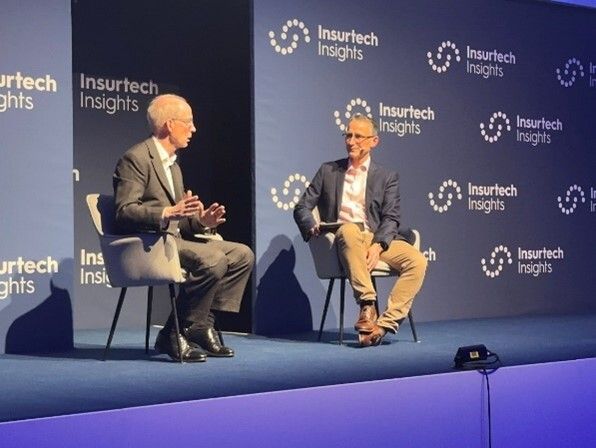Recently, I had the pleasure of interviewing Andrew Horton, the Group CEO of QBE, on stage at Insurtech Insights Europe. It was a packed conference (estimated by the organizers at around 6,000 attendees) – perhaps the busiest European Insurtech event I've personally witnessed since the phenomenon began in the mid-2010s.
During my conversation with Andrew, we covered many topics, including his view on the impact of Generative AI on the industry. Like other Financial Services CEOs, he believes that Generative AI will play a critical role, especially in underwriting and efficiency. However, what stood out to me was his refreshing and grounded view on the role of innovation within an insurer, or any company for that matter.

What really struck me about Andrew was his belief that everyone in the organization, regardless of their position or location, has a role to play in innovation. To paraphrase him, "people have ideas all the time, both while at work and outside in the evening or at the weekend." Consequently, he believes it's unreasonable to assume that one team's role is to innovate while another team's role is to deliver. Instead, he believes it's the firm's responsibility to capitalize on the creativity that exists everywhere and provide the cultural environment and permissions for everyone to feel that they can make a difference.
However, this doesn't mean that innovation processes and teams do not have their place. QBE Ventures has been successful in bringing edge technologies and disruptive plays into the business that would be difficult to develop organically. Additionally, there is value in purposefully bringing teams together to solve problems and capitalize on opportunities.
So, what are my takeaways? Simply put:
-
Everyone has a role to play in innovation, and it's the leadership team's responsibility to ensure that the firm's culture is accepting of ideas, even those that may not succeed. It's better to try and learn from the experience than to do nothing.
- Some of the greatest opportunities for generating value lie within the existing business and customer needs. Even small changes in processes, underwriting results, or growth trajectories can have a significant impact on the end-consumer and business value. This doesn't mean that the firm shouldn't explore new ventures or adjacent spaces, but rather that a balance is needed with a focus on value.
- Technology projects, and by implication, innovation projects, should be treated as business projects.
From a personal perspective, I thoroughly enjoyed the conversation. Andrew offers a practical and grounded perspective on the current state of innovation and the responsibilities of leaders in the insurance industry.
At Celent, we have been tracking the way innovation has been managed across the insurance industry for over a decade.If you’d like to discover more about our research in this area, check out our hub page or get in touch.








